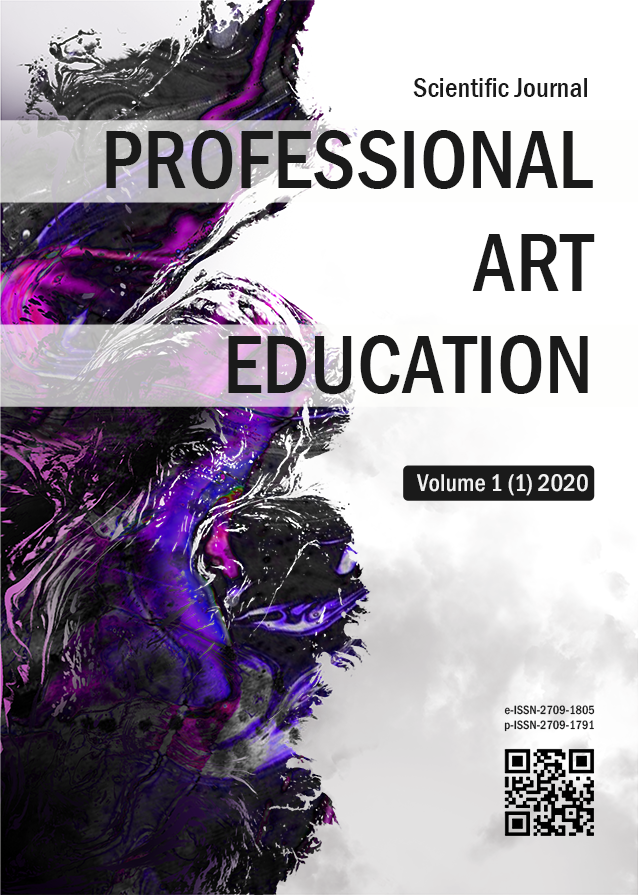Cultural and Leisure Activity of Clubs` Youth Centers of Pedagogical University
DOI:
https://doi.org/10.34142/27091805.2020.1.01.09Keywords:
cultural and leisure activity, structure of leisure, types of leisure, youth club, interest, needAbstract
Object. The article considers the issue of cultural and leisure activities of club youth centers of pedagogical higher educational institutions. The structure and types of leisure, forms of youth clubs` work are analyzed. Methods. The following methods were used when writing the article and searching for the material: analysis, synthesis, comparison. Results. One of the urgent problems of cultural and leisure activities of club youth centers of pedagogical higher educational institutions is the organization of youth leisure. Unfortunately, due to the socio-economic difficulties of society, the lack of adequate number of cultural institutions and insufficient attention to the organization of youth leisure, the development of non-institutional forms of youth leisure is most widespread. A new type of youth club is a qualitatively different social formation free from political layers, formalism, and strict
regulation of internal life. This institution should help meet the growing interest of young people in their history, cultural and artistic origins, household traditions. The use of free time by young people is a kind of indicator of their culture, the range of spiritual needs and interests of a particular individual of young person or social group. As part of free time, leisure attracts young people by its lack of regulation and voluntary choice of its various forms, democracy, emotional color, the ability to combine physical and intellectual activities, creative and contemplative, production and play. Yu. Striltsov, A. Zharkov, V. Chizhikov, V. Kovshar, T. Kiselyova, Yu.Krasilnikov made a significant contribution to the scientific analysis of the theory and practice of cultural and leisure activities. Stylistic and structural features of free time are reflected in research F. Vidanova, V. Dimova, I. Evteeva, L. Kogan, V. Pichi, A.Shchavel. Such scientists as I. Andreeva, N. Golubkova, N. Litovska, L. Shvydka are working on the problems of youth subculture functioning and cultural socialization. Sociological studies of the spiritual young people needs in the field of leisure in the Ukrainian scientists woks I. Bekh, I. Zyazyun, G. Sagach, I. Stepanenko, P. Shcherban, J. Yuzvak are carefully analyzed. The youth club provides an
opportunity to provide leisure as a means of entertainment and relaxation of individual and group stress; recreation as a means of replenishing psychophysical forces, restoring creative potential; compensation as a means of involvement in personally significant cultural values; socialization as a means of involvement in informal social processes and structures; self-actualization as a means of
embodying individual creative interests, as well as self-development and self-realization of personal growth in culturally significant areas of society. Conclusions. So, today, given the rising spiritual young people`s needs, increasing the level of their education, culture, the most characteristic feature of youth leisure is the growing share of spiritual forms and ways of spending free time, combining entertainment, information, opportunity to create and learn new things. Such «synthetic» forms of leisure organization have become youth interest clubs, amateur associations, family clubs, art and technical clubs, discos, and youth cafe clubs.
Downloads
References
Білецька, І.В. (2012). Особливості молодіжного дозвілля на сучасному етапі. Вісник ЛНУ імені Т. Шевченка. №22 (257). Ч.VIII, 220-228.
Ірхіна, Ю. (2019). Організація дозвілля студентів у вищих навчальних закладах України як проблема 21 століття. Науковий вісник мну імені в. О. Сухомлинського. Педагогічні науки. № 2 (65), https://doi.org/13.33310/2518-7813-2019-65-2
Кірсанов, В.В. (2002). До питання методології проектування поліфункціональних соціально-культурних програм. Вісник КНУКМ. №6, 40- 48.
Концепція громадянського виховання особистості в умовах розвитку української державності, (2000). Інформац. зб. Міністерства освіти України. Київ: Либідь. № 22, 7-21.
Musinova, N. (2019). Creation of conditions for organization of leisure and provision of residents with services in the sphere of culture in Moscow city. Vestnik Universiteta. 1(7), 76-81. https://doi.org/10.26425/1816-4277-2019-7-76-81
Опарина, Н.А., Мальцева, О.В. (2018). Культурно-досуговая деятельность как фактор повышения творческого потенциала личности ребёнка. Современные тенденции развития системы образования: сборник статей (Чебоксары, 19 нояб. 2018 г.). Чебоксары: ИД «Среда», 230-233. https://doi.org/10.31483/r-21803
Пішун, С.Г. (2005). Формування культури дозвілля студентів вищих навчальних закладів в умовах роботи студентського клубу (автореф. дисс. канд.пед.наук). Київ, 23с.
Чижевський, Б.Г. (2007). Актуальні проблеми побудови системи виховання в умовах державоутворення. Педагогіка і психологія, №1, 111-118.
Downloads
Published
License
Copyright (c) 2020 Чубукіна Олена Миколаївна (Автор)

This work is licensed under a Creative Commons Attribution-NonCommercial 4.0 International License.















